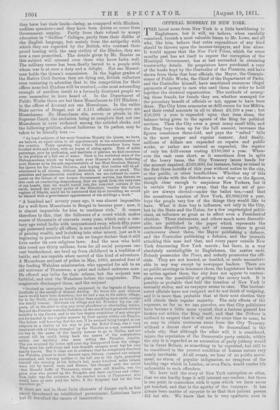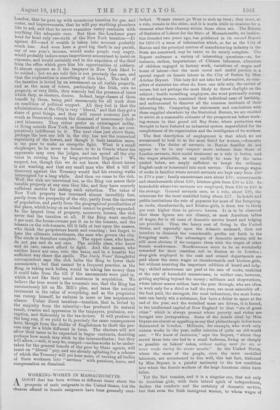OFFICIAL ROBBERY IN NEW YORK.
THE latest news from New York is a little bewildering to Englishmen, but it will, we believe, when carefully examined, furnish a most valuable lesson to Mr. Lowe, and all who, like him, believe that extra expenditure of any kind should be thrown upon the income-taxpayer, and him alone. It would appear that the New York Times, which for some months past has set itself to expose the corruption of the Municipal Government, has at last suceeeded in obtaining trustworthy details. Its proprietors have purchased a copy of the books kept by the Controller of the Finances, and have shown from their that four officials, the Mayor, the Commis- sioner of Public Works, the Chief of the Department of Parks, and the Controller himself, have sanctioned enormous illegal payments of money to men who used them in older to hold together the electoral organization. The methods of arrang- ing these frauds, for frauds they are, whether managed for the pecuniary benefit of officials or not, appear to have been three. The City hires armouries or drill-rooms for her Militia, and their rental amounts in all to about £8,200 a year ; but £56,000 a year is expended upon that item alone, the balance being given to the agents of the Ring for political services. Then the City owes a great many small bills, and the Ring buys them up for the full amount, increases the figures sometimes three-fold, and pays the "salted " bills in the most proper and regular manner. And finally, millions of dollars are expended on repairs and public works, or rather are entered as expended, the repairs of only ten drill-rooms costing £190,000 a year. When- ever the cash runs short, as it sometimes does in spite of the heavy taxes, the City Treasury issues bonds for the amount required, £560,000, for instance,being so raised in the first three months of this year without notice to the city, or the public, or other bondholders. Whether any of this money sticks with the distributors is not clear on the figUres, though clear enough to suspicious New Yorkers, but it is certain that it goes away, that the same set of peo- ple are always elected—under the ballot too,—and that the monstrous taxation of New York, £6,000,000 a year, buys the people very few of the things they would like to have. What it does buy is influence, not only in the City, but in the State and the Union, for a few unprincipled politi- cians, an influence so great as to affect even a Presidential election. These statements, and others much more discredit- able, are published in the paper which represents the moderate Republican party, and of course there is great controversy about them, the Mayor publishing a defence, and the Controller publishing a defence, and the journals attacking this man and that, and every paper outside New York denouncing New York morals ; but there, in a way absolutely unintelligible to Englishmen, the matter ends. Nobody prosecutes the Times, and nobody prosecutes the offi- cials. They are not hooted, or hustled, or made uncomfort- able in any way except by newspaper leaders. There are no public meetings to denounce them, the Legislature has taken no action against them, the city does not appear to contem- plate even the possibility of getting the money back. It is possible or probable that half the taxation of New York is annually stolen, and no taxpayer seems to care. The incrimi- nated officials have not resigned and do not think of resigning, and it is more than probable that at their next election they will obtain their regular majority. The only effects of the exposure, so far as we can perceive, are that City politicians have become a little more cynical, that a furious quarrel has broken out within the Ring itself, and that the Tribune is inclined to suspect that it will not, for some time to come, be so easy to obtain enormous sums from the City Treasury without a decent show of excuse. So demoralized is the whole city, that although the affair will, it is considered, injure the reputation of the Democratic party outside, within the city it is regarded as an accusation of party jobbery would be in Great Britain, as something to be regretted, but still to be considered in the present condition of human nature very nearly inevitable. At all events, we hear of no public move- ment, no storm of popular indignation, no symptom of the healthy rage which in London, or even Paris, would render life unbearable to such offenders.
We have told the story of New York corruption so often, that we can hardly hope it will interest our readers ; but there is one point in connection with it upon which we have never yet touched, and that is the apathy of the taxpayer. It has always been matter of surprise to us that that patient person did not stir. We know that he is very apathetic even in London, that he puts up with monstrous taxation for gas, and water, and improvements, that he will pay anything plumbers like to ask, and that he never examines vestry contracts with anything like adequate care. But then the Londoner pays head for head only one-sixth of the New York taxation—X1 against £6—and if wealth is taken into account probably much less. And even here a good big theft in any parish, say of one year's income, would make people very angry, would probably induce some impertinent accountant to insist on exposure, and would certainly end in the expulsion of the thief from the office which gave him his opportunities of robbery.
It almost appears as if the taxpayer in New York liked to be robbed ; but we are told this is not precisely the case, and that the explanation is something of this kind, The bulk of the taxation is levied by an assessment on all visible property, and as the mass of voters, particularly the Irish, own no property, or very little, they scarcely feel the pressure of taxes which they, as electors, decree. Indeed, large classes of them benefit by them, being paid enormously for all work done on condition of political support. All they feel is that the administration of the City is very " liberal," and that they get a share of good things, and they will resent economy just as much as Greenwich resents the dismissal of unnecessary dock- yard labourers. They either prefer an extravagant outlay, cr living outside New York, as thousands of them do, are com- paratively indifferent to it. The next class just above them, perhaps the best one left in the city, has not the numerical superiority of the lowest, and though it feels taxation more, is too poor to make an energetic fight. What is a small shopkeeper, be he never so decent, to do in Courts where his opponents may own the judges, and can spend all the city taxes in ruining him by long-protracted litigation a We suspect, too, though this we do not know, that direct terror is not wanting, and that any small man who filed a bill of discovery against the Treasury would find his evening walks interrupted for a long while. And then we come to the rich. Well, the rich are terrorized too, as the Ring can assess their taxable property at any sum they like, and they have scarcely sufficient motive for risking such extortion. The value of New York property has increased almost incredibly fast, partly from the prosperity of the city, partly from the increase of population, and partly from the geographical peculiarities of the place, which being on an island cannot be greatly expanded. In the largest item of property, moreover, houses, the rich never feel the taxation at all. If the Ring want another 5 per cent. the house-owners put it on to the tenants, and the tenants on the sub-tenants, till it falls at last upon the masses, who think the proprietors harsh and exacting ; but forget to hate the ultimate extortioners, the men who govern the city. The circle is therefore complete. The upper class, who know, do not pay and do not care. The middle class, who know and do care, cannot afford to fight. And the masses, who neither know nor care, vote the taxes, and in a humble but sufficient way share the .spoils. The Daily .News' thoughtful correspondent says the rich bribe the Ring to lower their assessments ; but that cannot be a frequent practice, as the Ring, in taking such bribes, would be taking less money than it could take from the till if the assessments were paid in, which is not like their usual acuteness in acquisition. We believe the true secret is the economic one, that the Ring has unconsciously hit on Mr. Mill's plan, and taxes the natural increment in the value of everything, and as the proprietor can recoup himself, he endures in more or less acquiescent silence. Unfair direct taxation—taxation, that is, levied by the majority from the minority—has produced its natural result, evasion and oppression in the taxpayers, profusion, cor- ruption, and dishonesty in the tax-leviers. It will produce in
the long run, if we yield to it, precisely the same consequences here, though from the dislike of Englishmen to theft the pro- cess may be a little different in form. The electors will not allow their taxes to be expended in bogus contracts, doubting perhaps how much may stick to the intermediaries ; but they will it may be, compel—useless works to be under- taken for the general benefit of the poor by State agents, will insist on " liberal " pay, and are already agitating for a scheme of which the Treasury will yet hear more, of turning all bodies of State workmen into " services " with pensions, leave, and compensation on dismissal.































 Previous page
Previous page